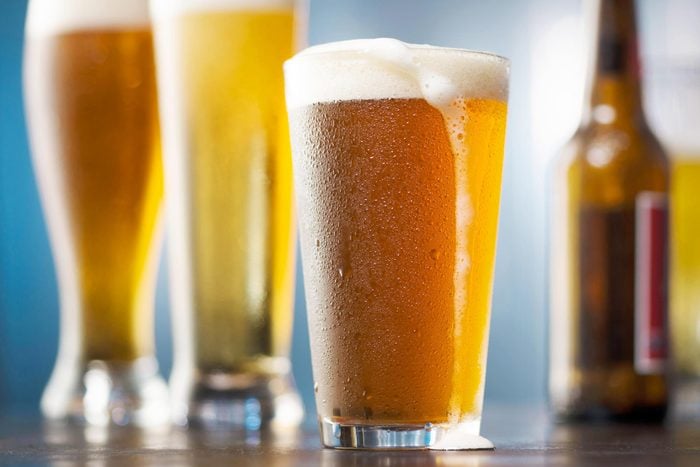I Drank Beer Every Day for a Week—Here’s What Happened
Updated: Apr. 04, 2023

What happens when you drink a beer every day? One health reporter gave it a try and discovered a range of noteworthy effects.
There are plenty of reasons not to drink alcohol. Alcohol can mess with hormones and is linked to heart disease and high blood pressure—plus, binge drinking is just a bad idea all around. If you read about what happens to your liver when you stop drinking, you might be inspired never to drink again.
Alcohol use guidelines from the Centers for Disease Control and Prevention (CDC) state that one drink per day for women and two drink per day for men is considered moderate drinking, but experts disagree about the safest amount of alcohol, which depends on factors such as a history of substance abuse, active mental illness, or health conditions such as diabetes, liver or kidney disease.
Still, at the tail-end of winter, I couldn’t help but be curious about what’s been reported as the mood-boosting benefits of beer. When I decided to drink a beer every day for a week, I hadn’t had a drink in about three weeks. I figured that with my body pretty “clean” from alcohol, it would be easier to identify the effects.
While doing this experiment, I consulted with J. Wes Ulm, MD, PhD, a physician-scientist educated at Harvard University and MIT, to explain what was happening in my body…and why.
I Drank Wine Every Day for a Week—Here’s What Happened
Drinking beer made me full
The first day I had a beer around 5:00 p.m. when I wrapped up my workday. I had dinner in the oven and sat down to play a word game. For this experiment, I chose to drink an India Pale Ale (IPA) brewed on a farm a few miles from my house in Upstate New York. IPAs are considerably heavier than Pilsners, and I noticed something many people do when they drink beer—I felt full.
“This is a common sensation, and it transpires due to several factors,” Dr. Ulm says. “One is simply the carbonation of the beer, which can give rise to a sense of bloating from the evaporating carbon dioxide used to generate the fizz.” This leads to “preprandial fullness”—which is a fancy term for feeling full before a meal.
Dr. Ulm explains that beer can irritate the stomach and can be inflammatory and acidic, which may lead to heartburn and bloating. “Alcohol also interferes with the metabolic processes that break down food and extract its calories and nutrition,” Dr. Ulm explains. “When an alcoholic drink is taken in, the liver prioritizes its metabolism over that of other calorie-yielding macronutrients such as sugars and fats.”
That sounded terrible. Not only did the beer make me full and not want to eat, but when I did eat, the beer interfered with my body’s processing of nutrients. That first night I ate dinner a bit later—once I stopped feeling full from the beer—and didn’t sleep great, which might have been from the beer or the later dinner. For the rest of the week, I had my beer after dinner, or with a bit of food.
“Most beers include malted barley as their source of grain, but wheat beers, by definition, contain grain content that is at least half wheat,” The Healthy @Reader’s Digest’s Medical Review Board co-chair Latoya Julce says, explaining this can also contribute to the full feeling after drinking a beer.
This Zero-Calorie Sweetener Was Just Linked to Heart Attack and Stroke
Drinking beer made me tired
Dr. Ulm points out that alcohol is a sedative, which is why it’s commonly called a “nightcap.” “The sedation often wears off at an inconvenient time and causes wakefulness in the middle of the night,” Dr. Ulm says, “The body will seek to ‘combat’ the sedation from the alcohol a few hours later by enhancing the level of compensatory stress hormones, such as cortisol and epinephrine.”
The rise in these hormones can wake a person out of even relatively deep sleep. Beer also functions as a muscle relaxant, and it can aggravate sleep apnea. On top of all this, alcohol (not just beer) is a diuretic, which can disrupt our sleep with nighttime bathroom trips.
I Tried Valerian Root To Help Me Sleep for a Week—Here’s What Happened
Drinking beer helped me feel relaxed
Regardless of whether I had the beer before, during, or after dinner, the relaxation was noticeable after the first few sips, and it’s no wonder why this sense of “taking the edge off” is a big part of alcohol’s appeal. “There is strong evidence that alcohol acts as a mimic for a substance called GABA, an abbreviation for gamma-aminobutyric acid,” Dr. Ulm explains. “GABA is a neurotransmitter that reduces the electrical activity in many parts of the brain, leading to a pleasant, relaxed effect, not unlike what’s felt after taking a sedative pill.” This might sound ideal, but it’s not.
“The flip-side of alcohol’s GABA mimicry,” Dr. Ulm says, “is that it can also impede the natural production and utilization of GABA itself, due to the feedback mechanisms of homeostasis as discussed above. This can lead to anxiety as the alcohol wears off, resulting in a greater need for alcohol consumption to reinstate the sense of relaxation.”
After drinking a beer every day: What happens next?
While I do enjoy the relaxing effect of a beer—and enjoying a cold one with friends is a timeless tradition that shows no sign of dying out—there are other ways to get a similar effect, especially when we’re talking about relaxation, which we all need now more than ever. “Deep breathing or meditation tends to more gently fine-tune the induction of GABA activity and the relaxed state it brings about while also controlling the activation of the brain’s reward centers than can spark addictive behavior,” Dr. Ulm says, which gives me all the information I need to know—enjoying an occasional beer with friends can be a good thing, but there are other ways to get the same relaxing effect.

